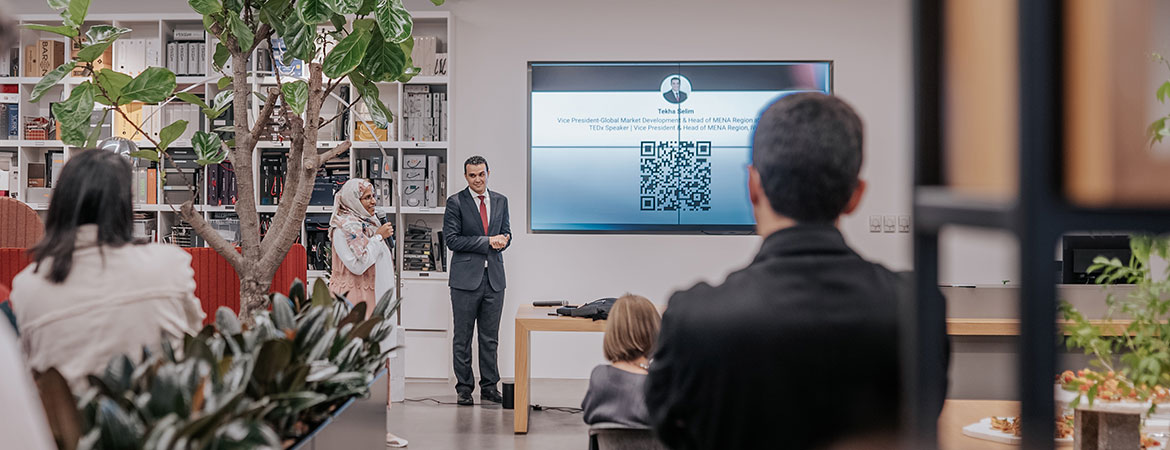Wellbeing event marks the fifth and penultimate event in Gensler’s Pathway to COP28
Gensler, the world’s largest design firm and an active advocate of sustainable practices within the built environment, has partnered with the International WELL Building Institute (IWBI) to host an event at Gensler’s office in Dubai. The occasion highlighted the different elements that contribute to overall wellbeing in communities and how achieving WELL building standards helps developers, architects, and designers stay on track in the fight against climate change within the built environment.
As Dubai prepares to host COP28 this week, Gensler played host to an event dedicated to unveiling the layers of wellbeing. The event touched on various practice areas from master-planning to hospitality, taking place at the Gensler Dubai office in Al Serkal Avenue, from 6pm – 8pm on November 22nd.
Tekha Selim, Vice President, Head of MENA Region, IWBI gave a keynote which focused on embracing the benefits of the wellness journey: “Globally, we spend 90% of our time indoors, and that can rise to 98% in this part of the world. As a result, we need solutions and strategies to make buildings and indoor spaces healthier. Our mission is to lead the global movement for putting people first in business decision-making and culture, and we introduced the WELL Building standard to do just that. We’re proud to have worked with a range of healthcare organisations and global design practices, including Gensler, to develop these standards. As design becomes more creative, we need to remember that places have a profound impact on our health and wellbeing, and we’re happy to be working closely with Gensler in support of our mission.”
Breakout sessions covered insights shared on; community wellness, design’s role in wellness, and envisioning the future of wellness.
Joyce Jarjoura, Studio Director at Gensler said: “Our healing cities interactive workshop was about engaging participants in defining what really moves the needle for healthy communities. Studies have shown that physical environments, healthy behaviors and socioeconomic factors are responsible for 90% of our wellness, whereas clinical medical care only accounts for 10%. The role that environment plays in wellness has never been more important.”
Diane Thorsen, Design Principal at Gensler shared her wellbeing expertise in hospitality and branded residential building design, including the key trends that are shaping the industry: “Over the past few years, we’ve seen a huge shift where wellness has been put firmly at the centre of design. From hotels that connect guests to nature and prioritize air quality, to branded residential buildings that integrate green spaces, people are more mindful and selective when choosing a destination and want wellness baked into the experience. We’re also seeing the emergence of design trends such as premedical pursuits that focus on healing, and ‘out of this world’ experiences that inspire awe. I’m excited to see how wellness and sustainability expand in authentic ways, and how design evolves.”
Steven Velegrinis, Design Director at Gensler led a session on urban planning for the planet and its residents health: “Cities have a huge impact on the natural environment, so it’s critical that we build spaces that allow communities to thrive and that promote ecological urbanism. We’re also seeing the rise of adaptive reuse of buildings, especially here in the UAE as it’s a sustainable and economically viable approach to breathing new life into existing buildings and spaces. When we look at wellness and sustainability, everything in the built environment needs to be considered, from air quality to the integration of green spaces. I very much look forward to continue working closely with our developers and construction community to move in a sustainable, climate friendly, direction.”
Samar Hussein, Associate and Design Resilience Regional Leader at Gensler led a session through a series of interactive touch points. She shared Gensler’s research on the topic from a local and global perspective, including insights from Gensler Global Wellness Leader, Stacey Olson. Samar commented: “As we are becoming more aware of the impact that the spaces and places we design have on societal wellbeing, it was essential for us to capture this topic through different lenses and discuss the various elements that influence the sense of wellbeing within our communities. We have recently established Gensler’s Wellness practice area to support this increased focus. As we approach this vital topic with our audience, we took this as an opportunity to envision the future of wellness in the region.”
The event concluded with a sense of empowerment, equipping attendees with knowledge and perspectives to contribute to healthier communities.
